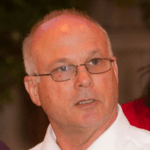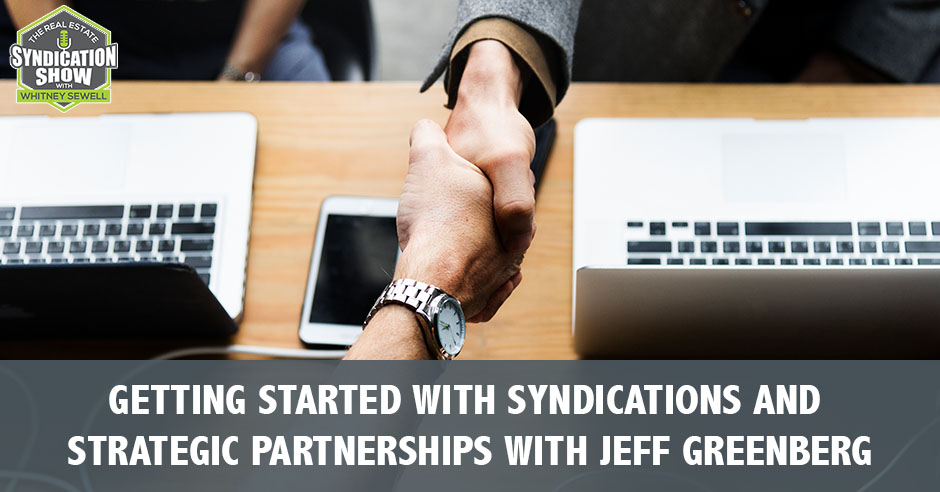Listen to the podcast here:
The big piece into succeeding in business is having the internal motivation and the right mentor. This is what Jeff Greenberg, CEO of Synergetic Investment Group, LLC, teaches us when it comes to becoming successful in our businesses. For him, real estate is about helping each other. Jeff shares some tips on how you can get started with syndication and strategic partnerships by building relationships. Adding value to somebody and having more persistence are other key factors to hasten success in any business.
Our Gracious Sponsor:
Are you wanting to learn how to gain financial freedom through having your own syndication business? Text LEARN to 474747 to begin to learn from one of the best in the industry, Vinney Chopra. Vinney came to the US with only $7 in his pocket, and now controls hundreds of millions of dollars of real estate he has acquired through multifamily syndication. He is now personally coaching others to do the same. Text LEARN to 474747 to begin your journey to starting your own syndication business! Vinneychopra.com
—
Watch the episode here:
Getting Started With Syndications And Strategic Partnerships with Jeff Greenberg
Our guest is Jeff Greenberg. Thanks for being on the show, Jeff.
Thank you, Whitney. I’m happy to be here.
It’s an honor to have you back on the show and we’re going to be able to share from your experience. Jeff has many years of experience in management, staff supervision, development and training. He’s the CEO of Synergetic Investment Group LLC, also known as SIG. Since 2007, he has been investing in multifamily and student housing assets and emerging markets. He has been an investor in $30 million worth of multifamily projects consisting of over 800 units. SIG controls over 317 student housing beds and properties in Georgia, Arizona and Ohio and is under contract on two properties in Texas and Kentucky totaling 292 units. SIG focuses on value add, student housing, market rate, multifamily and senior living multifamily properties. Jeff has run two REI clubs over the past several years and is active on BiggerPockets and other forums. Jeff, thank you for your time and for providing your expertise to the audience. I want us to just jump right into how you got started in the syndication business. Let’s talk a little bit about how others can get started. We’ll move from there into just partnerships and thinking strategically about partnerships and how others get started.
I’m not saying it’s the best way to get started or the only way to get started, but it is the way that I did. I happen to go to a real estate event and meet with a guru. I went and participated in his program for several years. I don’t know that’s the way that needs to be. I think that people need guidance. They need people that have more expertise than themselves and it could be a one-on-one mentoring with somebody that has gotten into the business and has become an expert in that business and doing it that way. I learned it that way. I followed their program for quite some time and then was able to purchase my properties and get involved with people that way.

It’s a question I get weekly about different coaching programs and should somebody sign up and pay this money to this person or why or why not. Finding a mentor is a must. It’s a non-negotiable. Everybody needs a mentor in many aspects of life. You’ve found this mentor. Are there other people that may be signed up at the same time you did but hasn’t been as successful as you that you know of? Do you know why?
A very large percentage of people that go into those programs from a seminar isn’t successful. I don’t blame the gurus that are putting on the programs as much so as the people lack the drive. I would say that typically is the big piece. You need to have that motivation. You need to have a strong why and you also need someone guiding you. Having somebody guiding you without your own internal motivation, if they can’t turn that on, if they can’t get that moving and you can’t do it or you’re not doing it, it’s not going to happen. To answer your question on why am I successful and there are others that aren’t, many others that I could think of, thousands of people that I had met over the years aren’t in the business anymore. It’s mainly that drive and that why. Why am I doing this? I would rather be doing a whole bunch of other things with the attitude that if you don’t get past that, you quit. You’re like, “This isn’t important. It’s not working. It’s not what they said.” They’re out of it. That’s what it takes. Anyone that I’ve ever talked to that’s been successful, unless they were extremely lucky, has gone through this. They started questioning why they were doing this, why were they traveling all over the country and going to all these events.
You’ve got to have that internal drive. Finding the right mentor is also part of it. I could relate a real short story. I had a guy call me up. He lived about twenty minutes away from where my meetup was and he asked if I had anything close to where he lived that he didn’t want to drive that far. I’m afraid I lost it and I chewed him out. I told him, “If you can’t drive twenty minutes to go to a meeting, don’t bother getting into real estate. Don’t bother opening a business. Don’t bother doing anything. Just stay at home and watch TV.” Twenty minutes is nothing. Sometimes I’ll drive two to three hours on a work night to get to a meetup. Somebody that couldn’t drive twenty minutes to come to a meeting shouldn’t bother. It’s the drive. You need to be motivated to do it and to see what’s at the end of the rainbow. It’s a great and fantastic business, but you have to work it.
I heard Terrell Fletcher speaking. He’s a football player and he related the process of becoming successful as a professional athlete like that. You have to love the process. He related it to being a boxer. If the process means getting punched in the face, but he knows after he’s punched in the face ten times then he’s going to be successful, he was just like, “Let’s get it over with.” You have to be ready. You have to love the process because by doing that, you’re going to get somewhere. You’re going to be successful. You’ve got to be willing to be punched in the face a few times and to keep going. You’ve got to have that drive. What would you say gave you that drive, Jeff? What made you stick it out? You’ve had some success now in numerous properties and kept you going through the learning and to get to that first deal.
[bctt tweet=”The greatest learning happens when you are uncomfortable.” via=”no”]
I was in the middle of a divorce and I saw that my retirement wasn’t going to be sufficient. I was going to be losing my house in the divorce and I knew that I had to do something. That was essentially the impetus that I wanted to be able to retire. I have a bunch of grandkids and I wanted to be able to spend time and do things with my grandkids and not worry about where the money was coming from. I’m also leaving a legacy to my family and to be an asset to them and be able to help them move along in their lives. That was essentially mine. The divorce was the big thing.
You just gave yourself no choice. You’re like, “This is what I’ve got to do,” for your retirement, for your family and you’re going to make it happen.
Sometimes that’s what it takes. Daymond John has a great book that I like called The Power of Broke. He profiles a bunch of people that have no other choice. They could have gone to the dark side, but instead, they pushed themselves through and were successful in their businesses. He’s one of those people that grew up poor and bad conditions and pushed himself to be a success. There’s a lot of that in these stories that people push themselves and they were successful because of that.
Are there other ways that you’ve seen people get into this business outside of paying a “guru” a lot of money or other friends that have gotten into this business and been successful otherwise?

You don’t have to pay for a mentor. We all need mentors but that doesn’t mean you have to pay for them in money. There are a lot of things that you can do for somebody that’s successful. That’s not just in the real estate, but that’s just about in any business if you find a way to be a value to them and their business to add value. You’ll find someone from one of your real estate groups that is successful in doing fix and flips. If that’s what you want to do and you add value to their business that you can learn from them, the apprenticeship process is the best way to do things, but you do need to add some value.
Could you elaborate on maybe some good examples of ways to add value? If I didn’t know you, Jeff, and I was just trying to get started into this business and I’ve seen that you’re successful and I thought, “I’d like to work with Jeff Greenberg.” What would be some ways that someone could add value to somebody that’s at your level of experience in a business like yours?
Most of the people that I know as syndicators, there are two things that they always need. They always need the deals and that’s appropriate deals not just properties that are coming out on being sent to them, but good deals as well as equity. Those seem to be the two big ones or at least they are in my circles. If somebody could evaluate a deal and bring a deal to me in a good market that’s been well thought out and well researched, that’s a huge value. The other thing is bringing in equity. If people can introduce a syndicator to new people that would like to get their money into or out of the stock market in the real estate, those are the two big ways that people have worked with me in the past.
Everybody needs deals with money to make it happen.
[bctt tweet=”There is always growth in you when you push yourself out of your comfort zone.” via=”no”]
That’s all part of the business.
If I was just getting started and I didn’t understand how to do underwriting, I don’t understand how to talk to a potential investor about what syndication is or how they could invest in commercial real estate. If nothing else, I could at least give you an introduction to people who I thought might be an investor.
I’ve had people that have given me introductions and we may get on a three-way call and I’ll go through my process of getting to meet the person. I do a little interview process of any potential investors and the new investor could listen to that conversation and hear from that and maybe down in the future feel a little more comfortable with it. It is difficult at first and I never thought that I would be raising funds for anything in my life. I’ve never been involved in sales and it wasn’t my forte, but now it seems that that’s what I do mostly. I spend most of my time creating and enforcing relationships and talking to people about real estate and deals, but I don’t try to sell anything. I let people know what opportunities we have that we’re providing and that makes it easy. I just let people know, “We’re looking at this 200-unit property. We’re going to be bringing in investors. We’re excited about it.” If they turned to me and say, “That’s nice,” we’ll probably end up going to another topic. If someone says, “That’s interesting, how do you do that? Tell me a little more about this. What returns do you get?” It’s a topic that we have to hedge around. I don’t feel it’s sales. If I have something that somebody wants, all I have to do is let them know that I have it and they’ll pursue me.
In getting started, it’s hard to get out of our comfort zone. It’s hard to put ourselves out there a little bit and do something different. Maybe it’s even talking on a podcast or talking in front of a group of people or even speaking at a local REI club or something like that. What are some ways that you had to overcome maybe that fear of just getting out of your comfort zone when you were getting started?

That was terrifying. I’ve always been an introvert growing up. People still look at me and say, “No way.” That’s the way it was in the beginning. I would be afraid to talk to people. The first time that my partner in one of the meetups said, “I want you to get up and open up the meeting.” My palms were sweating and my heart was beating away. It was difficult. I pushed myself and I said, “I’m going to do it.” The other thing I did is go to the Toastmasters and the first thing they asked me at Toastmasters was, “Why are you here?” I said, “I want to push myself out of my comfort zone. I want to be uncomfortable. I want to continue to be uncomfortable until I’m not uncomfortable anymore.” When you push yourself out of your comfort zone, you grow. Next time, your comfort zone is somewhere else so you push to the next level and you keep pushing to that level. That’s how you grow. You don’t grow by staying in your comfort zone. You’re just not going to grow.
Was Toastmasters something that helped you to be able to be better at speaking? Would you say that’s a beneficial group to be a part of?
I did need it as much as a lot of the other people that were there because I had been in management and I have talked to large groups of people before. I thought maybe it could help out a little bit and I feel it did. My motivation from the Toastmasters thing was more to network. That was more of it. Every time I had a chance through real estate into the topics that I had to present, my goal was more so of getting investors than improving my public speaking. There were a lot of people there that have a difficult time with public speaking and it was a good thing for them. I do think it’s a great program for someone that’s afraid to get up in front of people.
Did it help to find investors?
[bctt tweet=”We all have failures and disappointments. We can get pass them through persistence and determination.” via=”no”]
I never got an investor out of that program, but I met nice people.
Can you speak to how important it is to build relationships when you’re getting started? How you did that and maybe how that’s changed from how you were building relationships and nurturing the relationships from the beginning to the way you are now?
It is extremely important to build up relationships to find other people that you can help or they can help you or they know somebody that they can refer you to. The whole business of real estate is helping each other and being of some service to each other. In the beginning, it was difficult. I was very quiet. I was introverted. As I opened myself up more and more, now I could go into these situations and talk to people and walk up to people and say, “What are you doing? What business you’re in?” If it’s a real estate meetup, “What are you doing in real estate? What have you done?” You never know who’s going to be able to refer you to someone or something. Maybe they’re going to invest with you or maybe they know somebody that’s selling a property that you may be interested in. It’s definitely a relationship business.
My first two deals that I got were from some broker that I had met through LoopNet. He was born in California but he was living in Texas. We got that relationship because we have the California connection. Every time I was in that part of Texas, I stayed with him and his family and we became friends. We still text back and forth some and communicate some even though we don’t have a property involved anymore. It’s the relationships about getting the deals as well as the relationships with investors. On the deal that we just closed, part of the funds was raised by people that I had met in different situations and they were bringing in their network. By expanding to their network, I’m expanding my reach out. That’s important when you’re raising funds, when you’re looking for deals and when you’re formulating relationships.

I remember reading a blog or BiggerPockets where someone was talking about, “I’m very introverted and I’m afraid to talk to people.” I went into it and I said, “Get over it.” Do whatever you need to get past that. If you need to go to Toastmasters, if you need to push yourself in front of groups to talk to people, take a speech class at a college where you’re forced to give presentations in front of people, whatever it is, get past it. That’s very difficult unless you’re just wanting to be an underwriter or something and going to sit there and play with the spreadsheets and do some back-office type of stuff. If you’re going to be out there front facing and running your business, you better be able to talk to people, talk to vendors, talk to property managers, property inspectors. You need to be able to do that without being in fear of talking to people.
What’s been the best place that you’ve found those key relationships that’s helped move your business to the next level and people you can help as well?
A lot of it started out with the different meetups that I attend. In the beginning, it was great. I met a lot of people that were farther ahead than I was. I still go to some different bootcamps where I meet up with some people that are at my level or above my level. The most influential one is a mastermind that we’ve been involved with. There are some extremely impressive people in that mastermind that are open to talking to anybody at whatever level. For the most part, they’ve been there and done that. To ask them, you say, “What do you think of how I wrote my offering? Would you have changed anything? What about the structure of my deal? What do you think about that?” They can look things over in a snap and give you a comment on what their feelings are. Most of the time, it seems like on the local stuff, I may be the most experienced person in the room so I need to go places where I’m out of my comfort zone. I’m standing up in front of people with a lot more skill than I have and do a lot more than I am. In our group, we talk about what we can offer the group. That was one of the scarier things. You’re like, “How do I offer anything to this group? This is a phenomenal group of people.” To try to come up with what I could offer them is one of the more difficult things on how I can help them in their business. As you keep pushing yourself, you keep finding things that will improve you.
As you get out of your comfort zone, it causes you to grow and then you start to grow in other areas that you didn’t even know where they are. Initially, maybe you were going to those local meetups and that causes you to grow and then all of a sudden you realize, “I’ve got to find some other meetups or other groups like that mastermind.” That’s caused you to grow even that much more and pushed you to another level.
You’ve got to be comfortable being uncomfortable.
We were talking about how you got started and how other people can get started and just the importance of being driven and being ready to dig in and make it happen. We talk about the importance of relationships. What would be the thing now that you’re focused on? You’re building these relationships, you’re keeping those relationships going, you’re continuing to do that. How do you manage to make time to continue nurturing all these important relationships?
With a lot of the different stuff that I’m doing, I have other people doing the things that don’t need my attention. I have other people that are looking for deals for the most part and underwriting the deals. I have a team that’s been going out and doing due diligence with. That’s something that we’ve been delegating out to property management companies where we’ve been contracting with them to do some of that. That reduces the duties that I have. I have been working on getting my team to do more of the fundraising because that seems to be the one that a lot of people are more resistant to. They find it more difficult and more uncomfortable with. I tried to offload as much as I can and teach the rest of the team to do it. It was Chris Clothier that I heard talk at Joe Fairless’ conference. It was his first one. One of the things that Chris said was, “The CEO’s responsibility is to train his employees to replace him.” I thought, “That’s right. I want to train them so they can do the jobs that I don’t need to do. That means I could be doing other things to develop the company and to reach out farther.” It’s training people and getting people that can replace the jobs that I’m doing. That’s one of the things that I try to do. Right now it’s mainly the fundraising aspect of it, but my team does most of the other stuff.
Jeff, tell us the one thing that contributed to your success?
It’s the persistence. Get punched in the face and go on again and keep going. Robert Kiyosaki said, “Fail quickly so you can succeed.” Nobody that I know of has never had a failure or had disappointments. We all have that. You need to get past those. You can’t curl up into a ball and say, “Woe is me.” We just keep going on and keep pushing. Persistence and determination that we’re going to succeed, we just have to keep doing it.
Tell us how you like to give back.
I do a lot of work with people. I do some coaching on a fee basis, but I also do different clubs that I go to. I go to many different meetups where I get in front of people and talk. I was at a meeting that two or three of us had experienced that we’re sharing with a whole bunch of newbies and helping them understand the business. I do help people. If people have questions, I’m open to that. That’s typically where I help people out. I’m giving back to the community.
Jeff, I appreciate your time and expertise and sharing how you got started and just building these relationships that have been so important to growing your business. Tell the audience how they can get in touch with you and how they can learn more about your business.
You can go to my website which is www.SynergeticIG.com or reach out to me at [email protected]. I’m also on BiggerPockets. You can contact me through there. I’m on there a lot. Those are the best ways to get ahold of me.
If you want to know more about Jeff’s story or you want to hear more about his business and some more about student housing, go to show WS38. We talked a lot more about his business and about student housing and some other things. I appreciate you being with us and I hope you’ll be with us every time as we interview experts. You can go to Life Bridge Capital and you can connect with me. Don’t forget the Facebook group, The Real Estate Syndication Show, and we will talk to each of you.
Important Links:
- Synergetic Investment Group LLC
- Jeff Greenberg on BiggerPockets
- The Power of Broke
- Toastmasters
- LoopNet
- BiggerPockets
- Chris Clothier
- www.SynergeticIG.com
- [email protected]
- WS38 – past episode
- The Real Estate Syndication Show on Facebook
About Jeff Greenberg

Jeff has been an investor $30 million multi-property projects consisting of over 800 units. SIG currently controls 317 student housing beds in properties in Georgia, Arizona, and Ohio. SIG is currently under contract on two properties on Texas and Kentucky, totaling 292 units. SIG focus’ on value add Student Housing, Market Rate MF and Senior Living MF properties.
Jeff has run 2 REI clubs over the past 13 years and is active on Biggerpockets and other forums. In his spare time, he road cycles 100 miles a week and spends time with his grandchildren.
Love the show? Subscribe, rate, review, and share!
Join the Real Estate Syndication Show Community:




